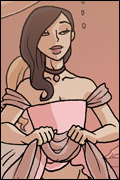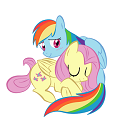|
Pathfinder is a retroclone of 3e, and as such works best the same way 3e did - with players that either don't know the issues and mostly ignore them (though potentially on accident) or with players that do know them but intentionally avoid them. There can still be problems (one player makes a Battle Oracle, another makes a fighter), but I would hesitate to call it "game ruining." Caster supremacy only ruins a game for the players if it's ongoing, to put it somewhat simply. On the other hand, caster supremacy even without heavy usage can really annoy the gently caress out of a DM. Assuming for players that don't wreck poo poo on purpose, even trying to avoid the accidental stuff tends to come down to "The DM has to do even more work"
|
|
|
|

|
| # ? Jun 12, 2024 05:35 |
|
G.M.K. posted:Haha, looks like I couldn't make the hard sell after all! Oh well. It was an obvious long shot. Yes, caster supremacy ruins a game. Yes, the game is better if all classes are balanced. INTERLUDE In your original version of this post you had just written "exactly balanced." However, I notice you have edited ", meticulously" in. Perhaps you'd like to throw in "mathematically", or better yet "rigidly"? It'd do a much better job of communicating to everyone involved exactly who they are dealing with. END INTERLUDE Why? Because if classes are badly balanced, people playing weaker classes will have less ability to engage with the game. As evidence I cite Dungeons and Dragons 3E and 3.5E, games in which many players found themselves struggling with the fact that their beloved characters grew more and more obsolete as the party increased in character level.
|
|
|
|
Ferrinus posted:
Oh snap son, you totally caught me before I edited my post like a thief in the night! Whats more, you have exposed me to the world . This is proof positive (to an eye as trained as yours) that I am...what? Please elaborate (mathematically/rigidly) on what the hell you're talking about so I can make fun of you properly. I've never been involved in a game where somebody ended up feeling totally obsolete because they didn't roll a caster. I have gamed with a LOT of people, and none of them have felt that way. Who are you talking about in particular?
|
|
|
|
As a complete aside from the balance discussion, I'd just like to recommend to fellow pathfinder players that you not pick up the Carrion Crown adventure path if you're looking for premade modules to run. Or, if you do, start on book three and either re-work or completely skip the first two. I love the idea of Carrion Crown -- that is, running through various horror movie cliches with your party, but it's pretty poorly executed from a game design standpoint. The first book, your party's main enemies are incorporeal (this isn't a spoiler; the book tells the players this), so even if you find some magic weapons, your non-casters are going to feel pretty drat useless only doing half damage to any enemy that actually matters. There will be total caster dominance from level 1 for anyone that has access to magic missile or positive energy. It all-but-recommends out of the gate that everyone play a caster or hybrid class, though skill-wise, you'll still need good variety. To "balance" this out, they decided to toss a bunch of constructs with complete magic immunity into the second book. I shouldn't need to explain why this is goddamn stupid. The challenges are all beatable (though I do think they set some of the non-combat skill check numbers just a bit too high), but very little of it is actually fun, thanks to an over-abundance of solo encounters and enemies that are designed primarily around being resistant or immune to the party's abilities. On top of all that, the second book suffers heavily from a complete lack of direction. I'm not going to spoil any of the plot, but basically, the writer(s) very obviously assumed that the party would be (or act like) crusading do-gooders, and towards the end, even our loving paladin said he felt he had very little in-character reason to do what we were doing. We were basically just slogging through a dungeon because we knew it would progress the story, and they even forgot to incentivize most of that dungeon-crawling with worthwhile treasure rewards. Short version: The first two books of Carrion Crown are full of decent ideas for a horror campaign, but they do a terrible job of taking into account party variety and player motivation. You could probably salvage a good campaign from them, but I don't recommend playing it as-written. Also, if anyone is wondering why I haven't quit the group, it's because we're all friends who still have fun hanging out together. Most the fun just isn't coming from the events on the table. Also, we're on to book three now, which is so far a huge improvement.
|
|
|
|
G.M.K. posted:Oh snap son, you totally caught me before I edited my post like a thief in the night! Whats more, you have exposed me to the world . This is proof positive (to an eye as trained as yours) that I am...what? Please elaborate (mathematically/rigidly) on what the hell you're talking about so I can make fun of you properly. What, indeed. quote:I've never been involved in a game where somebody ended up feeling totally obsolete because they didn't roll a caster. I have gamed with a LOT of people, and none of them have felt that way. Who are you talking about in particular? The greater whole of D&D players? The gross imbalance between spellcasters and non-spellcasters that emerges around level 9 or 10, and the damage it does to continuing games, are widespread and widely known. Most people do not choose the Fighter class to play a character who is at best a janitor and at worst a helpless liability, but they end up in this role because the rulebooks are not honest as to what being a Fighter actually entails.
|
|
|
|
Caster supremacy talk always stresses me out if I read it for too long because I'm the type of guy who likes to solve problems RIGHT NOW and there's no quick and convenient way to solve it. Fixing caster supremacy would require such a huge overhaul of Pathfinder in general that I might as well just design my own game from the ground up. 
|
|
|
|
You know what's a little baffling, but honestly not at all surprising? The Book of Nine Swords classes still stand up in Pathfinder. I can see why WotC went so far in that direction with 4e because Jesus Christ, the differences between a 3.5e Fighter and a 3.5e Warblade are like day and night.
|
|
|
G.M.K. posted:so I can make fun of you properly. Do not do this. It will end poorly. G.M.K. posted:Okay, so new question: does caster supremacy ruin a game? Is it better if all classes are exactly, meticulously balanced? Why or why not? I would not go so far as to say caster supremacy outright ruins games. If I felt that way, I wouldn't play this game or, likely, post in this thread. That said, I do think caster supremacy harms games - what particularly bothers me about 3e-style caster supremacy is that is it's very easy to accidentally make a character that is either awful and incompetent or hypercompetent. This in turn means it's very easy to have a wildly unbalanced party in which one character can potentially do literally everything better than another, and that's no fun. If I may touch briefly on the lists (I feel like I did a decent job setting the stage for discussion, there), compare the level of generality of the items on your wizard list (e.g. "magical buffs," "summon monsters") with that of those on your fighter list (e.g. "wear heavy armor," "wield martial weapons"). The wizard items tend to be much more general (i.e. they encompass more discrete options and capabilities) while fighter items are barely discrete at all. Notice how, despite this, the wizard list is still longer.
|
|
|
|
|
Ferrinus posted:The greater whole of D&D players? The gross imbalance between spellcasters and non-spellcasters that emerges around level 9 or 10, and the damage it does to continuing games, are widespread and widely known. Most people do not choose the Fighter class to play a character who is at best a janitor and at worst a helpless liability, but they end up in this role because the rulebooks are not honest as to what being a Fighter actually entails. If we're going to try to examine an old cliche to see if it holds up, "Everyone knows it's true!" is a pretty poor argument. It doesn't have to be all or nothing here - caster supremacy may a thing, but that doesn't necessarily equate to everyone else being rendered obsolete. Have you actually seen this happen in a game? OpenlyEvilJello posted:I do think caster supremacy harms games - what particularly bothers me about 3e-style caster supremacy is that is it's very easy to accidentally make a character that is either awful and incompetent or hypercompetent. While I'll cede that it might be possible for a group of new players to all sit down and roll up characters, then discover that the wizard has somehow become startlingly superior to everyone else, I feel like you're overstating the probability of this happening. In fact, I'd go so far as to say that it is crazy improbable that a brand new player would accidentally create a hypercompetent wizard while his friend can't figure out how which end of the sword to hold. Even gaming with people that really know their poo poo, I've managed to keep my martial characters relevant at high level play. That said, I admit to avoiding groups that have hardcore number crunchers that set out to break the game, because I realize that they probably could if they really wanted to. We likely wouldn't get along anyway, so it isn't something I consider a problem.
|
|
|
|
Personally I've had less of an issue with the "hardcore number crunchers" because they tend to know the system well enough to stay away from the broken stuff.
|
|
|
|
G.M.K. posted:Oh snap son, you totally caught me before I edited my post like a thief in the night! Whats more, you have exposed me to the world . This is proof positive (to an eye as trained as yours) that I am...what? Please elaborate (mathematically/rigidly) on what the hell you're talking about so I can make fun of you properly. I have to say that I agree with the second paragraph of this post: while I can see, and agree with, the fact that casters have powers and options that non-casters can only dream of, I have not seen this have a huge effect in actual gameplay. Generally the people who play casters are trying to play the game in such a way that their character is an asset to the party without overshadowing it. It is a fact that a well-optimized caster will always be better in almost every way than a well-optimized non-caster, but people rarely play optimized characters (in my experience). They take spells that fit their character which may not be "ideal" spells, they spend their skill points on things that matter to the campaign instead of whatever would give them the biggest bonus, they take feats that they think are cool instead of just piling on metamagic feats, etc. etc. Basically what I'm saying is that while caster supremacy is definitely a real problem with the way that the game is designed, it is much more uncommon for it to be a problem with the way that the game is played. If a caster is making the rest of the party feel useless, then it's the player doing it, not the class. This is a game that you play with people, not with characters.
|
|
|
|
I've been in games where someone has wanted to be a 'utility wizard' and solve problems with spells and apply crowd control type things onto people and leave the fighting to other people. Turns out Sleep, Knock, Rope Trick etc are the spells they picked and very rapidly the game became about building and designing encounters around the Wizard and the rest of the party were just extra coup de grace attacks. Had the same thing with a cleric who wanted to self-buff and be a warrior priest. Turns out for 8 or so rounds a day the Cleric is twice as good as a fighter and forcing 9+ rounds of combat a day on a party was a completely contrived thing and really obvious for the players. Also after that the Cleric was fairly useless and just hung around doing nothing so it was basically never fun for everyone at once, which is the goal of a balanced system: That everyone can be useful in every combat and everyone can be useful out of combat. These are with newbie players, with experienced players (that I play with more than once!) they self-moderate and play within the system to try and tone stuff down but it's actually pretty hard to constantly separate character interests and self interests and not just whip out something great when you really need it. Genuinely dying in a long term campaign in a random fight when you could've just prepared better spells is a tough thing to do for even a 'good' roleplayer.
|
|
|
|
G.M.K. posted:If we're going to try to examine an old cliche to see if it holds up, "Everyone knows it's true!" is a pretty poor argument. It doesn't have to be all or nothing here - caster supremacy may a thing, but that doesn't necessarily equate to everyone else being rendered obsolete. Have you actually seen this happen in a game? Wait a minute, you're saying that you're going to discount basic critical analysis of the game's mechanics but will listen to permanent testimony from one random person, i.e. me? Well, that's a lot easier then: I played a lot of 3.5 before 4E came out and saw caster PCs dramatically and grossly overshadow non-caster PCs as soon as the game got to around level 9 or 10. This has happened even in games without a wizard, cleric, or druid; I've seen something as piddly and second-rate as a Dread Necromancer completely break encounters apart and stop every other PC from even having to bother to fight with a single spell. Boom, headshot, you have to concede now. I'm sure you're not going to just pull out your own meaningless personal experience as a counter-anecdote and leave the discussion exactly nowhere. Ferrinus fucked around with this message at 19:15 on Mar 28, 2012 |
|
|
|
I think everyone has pretty much covered the problems with wizards, but I think I can elaborate a bit. Throwing a Fireball or Lightning Bolt are considered the staples of wizardly powers, but doing damage is the weakest thing you can do in Pathfinder. New players probably won't stumble upon Wizard supremacy because they want to go boom because...boom! Welp, out of booms for the day, guess I'll just sit in the corner. Fireballs don't end encounters, Glitterdusts, Webs, and sometimes even Greases do. Those are all 2nd or 1st level spells that once they land, you may as well call it and just agree on an amount of HP damage to take. The most powerful wizard spells exploit the economy of actions. Grease makes them spend their move to stand up, and if they want to attack, they'll have to charge if no one's around. Web prevents line of sight, any 2 handed action, and is 40 feet of difficult terrain even if they save. Glitterdust debuffs someone so hard RAW that they are essentially a noncombatant. And none of those spells even allow spell resistance. Without even getting into Walls of Force, a properly budgeted encounter becomes split in half by a well placed spell, which leads to the DM throwing increasingly harder encounters at the players. The wizard won't be exhausted of spells by these encounters, because they're not even burning at full power. They just need to cast one to two spells and the encounter is done, and they have a poo poo ton of spells. In addition to combat utility they can Fly all day with Overland Flight, make a safe place to recover with Rope Trick, and use Wands and Staves so they don't have to actually memorize anything for utility. It can take just one selection to make a wizard pretty strong compared to everyone else. I found Glitterdust because I thought I'd be a weird little Gnome who didn't want to hurt people directly and wanted some girly spells. Two sessions later and the GM is having people start wearing goggles they can remove to cancel the blindness. He doesn't have to do that against the Rangers and Rogues because they work within the confines of the system and do what the system expects them to do. A common contrast is to the Fighter, which is probably one of the weakest classes of Pathfinder. With the correct feat selection, a Fighter can be good at dealing damage and very, very localized battlefield control. But after evaluating the system, damage isn't something you should really care about being good at. Damage is the bullet that kills the encounter after the wizard fires it. How good you are at dealing damage only determines how long it takes to hit. The fighter can be good at taking hits, but AC doesn't scale as well as monsters' attacks and involve a high wealth investment to get decent scores. Harder encounters to combat the wizard's trickery just make this disparity greater, because harder monsters come with more hit dice, making their To Hit higher and giving more hit points, making the damage dealers' contributions even less effective proportionately. This has gotten pretty long, but I'll just say that it's a problem that exists at every level and some new players may not stumble upon it until later. But even at 1st level a Wizard can play smart and never run out of spells while still effectively ending encounters on the first round.
|
|
|
|
I need some encounter ideas for an upcoming Pathfinder one-shot that I'm planning. We have a regular campaign that has been going on for two years now, but it has become tradition to put aside the campaign for special one-shot holiday themed games with pre-gen characters. The Halloween and Christmas games ruled. Now it's my turn and I'm going to run a game with an Easter theme. Here's the plot: The characters are all allies of the pixies that inhabit a nearby wood. One day a local wizard drives his cart absent-mindedly through the wood and drops a basket on the ground without noticing. The basket contains a bunch of cockatrice eggs. The pixies are worried about a bunch of cockatrices running around turning everyone to stone, but they can't bring themselves to actually destroy the eggs because they are pacifists. So they ask the party to take the eggs away up into the mountains and relocate them with a cockatrice family willing to adopt them. The party consists of: - A pixie, the group leader. - A woodsman (ranger 4), charmed by the pixie about a month ago and used as a helper. - The young deputy sheriff of the nearby village (commoner 3/warrior 2). He fell asleep under a tree and the pixies woke him up and asked him to help. - A blink dog (paladin 1) on a quest who happened to be around. - A lantern archon (cleric 1). Your standard angel-in-training looking for a good deed to do in order to earn his wings. - A young halfling girl (druid 4) and her pet black bear "Teddy". - An awakened rabbit (witch 3). He used to be a witch familiar and was rewarded for his long service. Now he's taken up the trade. - A tengu (bard 4) with yellow feathers instead of black. He looks more like a chicken than a crow. I need to come up with 2-3 fun encounters before the climactic battle where the party defends a cockatrice mom against some greater threat. Any help would be appreciated.
|
|
|
|
G.M.K. posted:Even gaming with people that really know their poo poo, I've managed to keep my martial characters relevant at high level play. Was this through abilities your characters could actually do on their own, or through magic items and buffing spells from the casters?
|
|
|
|
Hmm, looks to be a fairly mixed group, so it might work a bit better to use large numbers of lower CR critters, backed with favorable terrain rather than high level critters that the weaker characters can't do much about. Encounter 1: A tribe of Gremlins(I THINK your group can handle 6 Jinkins and 6 Vexgits, assuming neither are actively trying to kill them) discover the party and its interesting cargo and scheme to have some fun with it. The gremlins create a distraction by setting up greased pits and nets around the PCs campsite when they stop. Make them such that they go off on seemingly arbitrary conditions(like third person to step on it, or a particular size/weight). While the PCs are distracted, they sneak up and the Jinkins steal some of the eggs, while the Vexgits sabotage their gear by dismantling pretty much whatever they get their hands on. They flee once they are detected or the PCs get out of the traps. They however, leave easily followed signs of what they did, and a trail that can be followed(just find where all the traps go) Route 1(gremlins succeed in theft): The gremlins then jinx the eggs to make whoever has them(not the eggs, whoever's nearest to them at the moment) smell magically delicious. They abandon the eggs as soon as the PCs are seen coming, along with the expected snares. As soon as a PC sets off one snare or get the eggs, cue Encounter 2 proper. Giant Toads show up next with an obsession to eat the PCs nearest the eggs. As soon as they deal with those, they are beset by more harmless animals(rabbits for example), as well as swarms of vermin, which pursue them until chased off or outrun. At this point they'd probably want to chase the gremlins down and make them take the jinx off, or just deliver the eggs as soon as possible. In the former case, you could have a pitched battle, with the gremlins armed with saps(so they can have more fun with the PCs if they win) and if the PCs win they can force any surviving gremlin to tell the catch to the curse to end it harmlessly.. If they chose to speed the delivery instead, the PCs are stalked by a Megaraptor or two who also finds them delicious, and have to get rid of it somehow or defeat it. Route 2(gremlins fail to steal the stuff) With low level PCs, damage reduction and generally being hard to nail down, the gremlins flee, figuring its Personal and set up at a bridge along the way, which they rig to partly collapse when one of the pests pulls a lever. A bridge a troll is sleeping under. Now they're fighting waist deep in water with a wounded and annoyed troll, with no easy way out. Enraged beyond reason at the prank failing, the gremlins make up the third big fight as they pepper another location with more Snares, before swinging from trees and generally being murderous little bullies. Concluding scene: As they deliver the eggs, the PCs face off against golems(not sure what type) sent by the wizard to get the eggs back, but the golems slip out of control and now they have a fight the cockatrice can't help with. Note: Any gremlins slain before the final encounter with them are replenished from their tribe, its easier that way. Numbers may need serious tweaking to fit your group.
|
|
|
|
Ferrinus posted:Wait a minute, you're saying that you're going to discount basic critical analysis of the game's mechanics but will listen to permanent testimony from one random person, i.e. me? Well, that's a lot easier then: I played a lot of 3.5 before 4E came out and saw caster PCs dramatically and grossly overshadow non-caster PCs as soon as the game got to around level 9 or 10. This has happened even in games without a wizard, cleric, or druid; I've seen something as piddly and second-rate as a Dread Necromancer completely break encounters apart and stop every other PC from even having to bother to fight with a single spell. Yes, I am going to discount speculation and ask for personal testimony. My plan from there was to ask somebody giving that testimony to describe the situation a little more clearly in terms of who was playing what, and whether or not the people playing the non-casters were simply inexperienced (as newbies tend toward simpler classes). However, since you keep acting like this is a pissing contest, and just can't seem to quit being a jerk, I kind of hope you won't contribute anymore. We were having a good time until you showed up. On to people without a chip on their shoulder... I regret that I tried to champion a fighter vs a wizard in the first place. A fighter is (I hope we can all agree) the most narrowly defined of the martial classes, while a wizard is (arguably but probably) the most versatile class in the game through the use of their spells. Never stood a chance. Totally ready to cede that there is a thing called "caster supremacy" at this point. What I'm trying to figure out here is how damaging to the game it really is. GaryLeeLoveBuckets and Karandras - this is the sort of stuff I was hoping to read about. These stories do a great job of showing how casters can be unbalancing without even intending to be (though it kind of sounds like the battle cleric was doing his best to play a super saiyan at the cost of all else). I submit the following rebuttal- If you're running a traditional setting, it is a world with a lot of magic. The versatility of magic often means that people (and smart/well funded monsters) have a variety of countermeasures. When I run games, I admit that I do sometimes tailor encounters around casters - but I do so from an in-game perspective. If a PC is playing a bastly-mage, bad guys with money might invest in items that protect against elemental damage. If somebody is running a cleric of Desna, the bad guys might have counterspells ready against the Chaos and Travel domains. Golems. That is all. Speaking as a GM of 10 years, planning encounters with all of the party's strengths and weaknesses (even if a lot of those strengths come from wizardly trump cards) in mind hasn't felt like a burden, or as though I somehow had to work "outside" the system to do it. It seems like something the system handles very well, in fact. 
|
|
|
|
Here's another question: How does Caster Supremacy stack up in Epic Six? Specifically, once you've capped and gotten a few more feats under your belt? I imagine by that point, most Wizards are just throwing feats into getting their DCs up, while martial classes are starting to hit that level 8ish sweet spot of "spring, three attacks, cleave into the next guy". I ask because I'm seriously considering tossing my lot in on a Pathfinder Epic Six group Let's Play (since tabletop LPs are apparently a Thing now) and I'd like to know if I should still watch out for having to plan everything around the wizard. girl dick energy fucked around with this message at 20:51 on Mar 28, 2012 |
|
|
|
Really Pants posted:Was this through abilities your characters could actually do on their own, or through magic items and buffing spells from the casters? Magic items had a lot to do with it for sure! High level play expects you to have access to them though, so I don't really take that as anything against the class. Everybody uses magic goodies to keep pace with the CL.
|
|
|
|
veekie posted:Gremlins and Golems, oh my! That actually sounds pretty fantastic. I may just use most of that.
|
|
|
|
ltugo posted:- A tengu (bard 4) with yellow feathers instead of black. He looks more like a chicken than a crow. How over the top are we looking to go here? I've got visions of viscous dire rabbits, shambling mounds made of plastic grass, and jelly-bean flavored oozes dancing in my head. I'd like to add to veekie's nifty gremlin idea by suggesting that they be led by a rabbit-headed pugwampi (perhaps with a level or two of rogue) that sneaks into camp while they sleep and hides the eggs. ...and the golem at the end is made of hollow chocolate, maybe? 
|
|
|
|
G.M.K. posted:Yes, I am going to discount speculation and ask for personal testimony. My plan from there was to ask somebody giving that testimony to describe the situation a little more clearly in terms of who was playing what, and whether or not the people playing the non-casters were simply inexperienced (as newbies tend toward simpler classes). First off, being a jerk? What? You were the guy just licking his lips in anticipation of mocking me or whatever. I'm just trying to be helpful by laying down the facts. Discounting speculation and asking for personal testimony is stupid, though, because you might get the personal testimony of someone whose resident wizard only ever memorized 1d6/level evocations and whose resident fighter was built by someone using six separate sourcebook who accidentally added a zero onto their recommended wealth by level. I mean, obviously, the vast majority of the testimony you're going to get is going to be about casters grossly overpowering the game, but since you've clearly decided ahead of time what conclusion you're going to draw from the data there is nothing stopping you from countering with your own testimony, or pointing out that the DM was making some sort of mistake, or whatever. In fact, you did it right up there! "Whether the people playing the non-casters were simply inexperienced". Inexperience on the part of a fighter is completely irrelevant to mid to high level D&D, since fighters are poo poo to start with. quote:I submit the following rebuttal- Golems? Are you joking? Golems? What kind of wizard couldn't trivialize a golem? Counterspells? Resistance to elemental damage? How were you planning to judge inexperience on a player's part, exactly, when you yourself are clearly inexperienced as a player? Either way, you yourself have admitted it: you tailor encounters around casters. Does that actually counterbalance casters, such that casters aren't any more capable of contributing to the resolution of an encounter than non-casters? No, obviously not. What it does do is subtly reinforce spellcaster primacy. The single most important piece of information about any oncoming challenge becomes: To what extent, and by what strategy, have our opponents attempted to counter our own spellcasters? How can we countermand or bypass their anti-spellcaster measures so that we can bring our spellcasters fully to bear? Both PCs and NPCs, allies and enemies, implicitly and explicitly acknowledge that the party's spellcasters are its most important characters. In the course of running a game of D&D, you, the GM, are forced to pay the wizard more attention and give the wizard more spotlight. Gosh, can a situation in which one player constantly receives more attention, acknowledgement, and importance than another possibly harm gameplay? I- I just don't know. I can't see it. Guess I'll have to poll the crowd, Ferrinus fucked around with this message at 21:08 on Mar 28, 2012 |
|
|
|
G.M.K. posted:Golems. That is all. Golems are better at stopping melee characters than casters. They're only immune to spells that allow Spell Resistance, so plenty of show stoppers still work. Ironically, they're intended to counter casters but only annoy damage dealers because of their DR. Edit: beaten 
|
|
|
|
G.M.K. posted:I regret that I tried to champion a fighter vs a wizard in the first place. A fighter is (I hope we can all agree) the most narrowly defined of the martial classes, while a wizard is (arguably but probably) the most versatile class in the game through the use of their spells. Never stood a chance. The problem with the fighter is that it's not narrowly defined at all. Each other class has their own niche, it might be a lovely niche, but it's theirs. The fighter is a classless class, they couldn't think of anything to do with it so they just threw feats at it. Feats are something anyone can get, and even the fighter-only feats aren't worth being a fighter. Fighter is the class you take for exactly two levels before you go into your prestige class or since Pathfinder's prestiges are all terrible, for level 6 and 7. This doesn't mean that people can't have fun playing a fighter and a miserable time playing a caster. I know guys who just want to knock the piss out of monsters with a gently caress-off greatsword and not worry about raging or holy vows. When I play wizards, I focus on a lot of party buffs like Haste and Enlarge Person because keeping everyone else happy probably means the campaign will continue.
|
|
|
|
GaryLeeLoveBuckets posted:Golems are better at stopping melee characters than casters. They're only immune to spells that allow Spell Resistance, so plenty of show stoppers still work. Ironically, they're intended to counter casters but only annoy damage dealers because of their DR. Their construct traits make them immune to a lot more than their spell immunity, though. Yeah plenty of show stoppers still work, but lets not go nuts here and act like a caster that didn't expect to meet one that day has nothing to worry about. Edit: not yet! 
|
|
|
|
G.M.K. posted:Their construct traits make them immune to a lot more than their spell immunity, though. Yeah plenty of show stoppers still work, but lets not go nuts here and act like a caster that didn't expect to meet one that day has nothing to worry about. When I read Construct Traits, all I can see is "immune to all the spells we put in as traps or to pad out the book size."
|
|
|
|
G.M.K. posted:Totally ready to cede that there is a thing called "caster supremacy" at this point. What I'm trying to figure out here is how damaging to the game it really is. Well, there you have it. The way in which "caster supremacy" damages the game is by making the player of the caster the most important member of the group. By tailoring encounters around him, you are explicitly reinforcing his superiority. It's not just that the characters of your fighter PCs can't do as much. It's that the players can see that their decisions and contributions are just plain less relevant. They are the second string.
|
|
|
|
Augure posted:Well, there you have it. The way in which "caster supremacy" damages the game is by making the player of the caster the most important member of the group. By tailoring encounters around him, you are explicitly reinforcing his superiority. Pathfinder is a game that works best when everyone works as a team. Without the support of the rest of the party, a wizard won't last long (in the field, I mean. of course he can just teleport away and retire if he wants) on his own. Maybe the other team bases their strategy around his, and he's basing his strategy against the other team's, but the rest of the team needs to be involved to make it work out for the best. So if the rogue or the cleric or, yes, even the lowly fighter isn't on the ball, the whole thing can go to poo poo. Just like a quarterback can't win a game all by himself! ...And so it's come to this. A football analogy in a debate about tabletop games.
|
|
|
|
G.M.K. posted:So if the rogue or ... yes, even the lowly fighter isn't on the ball, the whole thing can go to poo poo. Just like a quarterback can't win a game all by himself! Nope, wrong.
|
|
|
|
To be fair, if the quarterback could turn invisible and fly into the end zone, and the game was decided on the first possession, then the football analogy would definitely work for this situation.
|
|
|
|
But this isn't a football comparison. That assumes the quarterback cannot also literally be every other member of the team. See, I don't think you really get the problem. The problem isn't so much that you can have a wizard who is better then a fighter or a rogue. The problem comes when you build a party, and you ask "Well I could make a fighter, or I could just make a Battle Oracle who is better then the fighter in literally every way imaginable." "I could make a rogue, or I make an archeologist bard who is the rogue but also has level 6 spells." I mean, look at your own analogy. If you had one type of guy who was great at defense, one type of guy who was great at offense, and one guy who was great at everything that could ever be done in football, would you want a "balanced team," or would you go "Give me a bunch of that last type of guy." The question isn't "Why shouldn't the cleric buff the fighter?" The question is "Why shouldn't you have two clerics?"
|
|
|
|
Chernobyl Peace Prize posted:To be fair, if the quarterback could turn invisible and fly into the end zone, and the game was decided on the first possession, then the football analogy would definitely work for this situation. It holds up as analogies go, because both "quarterbacks" have the same abilities if we're talking about equal teams. Edit: ^ this is not true ^ G.M.K. fucked around with this message at 22:55 on Mar 28, 2012 |
|
|
|
ProfessorCirno posted:But this isn't a football comparison. That assumes the quarterback cannot also literally be every other member of the team.  Glad you asked! The answer is... Glad you asked! The answer is......
|
|
|
|
G.M.K. posted:Pathfinder is a game that works best when everyone works as a team. Without the support of the rest of the party, a wizard won't last long (in the field, I mean. of course he can just teleport away and retire if he wants) on his own. Maybe the other team bases their strategy around his, and he's basing his strategy against the other team's, but the rest of the team needs to be involved to make it work out for the best. To the first Paragraph: You're wrong. A well made wizard is harder to kill than every other member of the party combined (except maybe a cleric) unless you are specifically making an encounter to counter the wizard. If wizards need the other players, then they're really bad at spell selection and proper use of meta-magic, especially past mid level. The only time a wizard needs a party is when he's facing something immune to magic (and I don't mean anti-magic, because that's just unbeatable spell resistance and he can rely on non-resistable spells). As to the second point, the only difference in the colts difference from this year and last year was the quaterback, and they lost 12 more games than they've lost in their nine years with Payton Manning. So, if given a choice, I'd rather have the rest of my team be lovely and have the greatest quarterback (mage) and person for him to give the ball to (cleric) and let the rest of the schmucks suck it up and be ignored. Also, to continue your lovely analogy, we can accept that non-full progression casters are the line because they're faceless and easily replaceable in all but a few instances, and they literally have to be one of the best players in their position ever to get any coverage.
|
|
|
|
I think football games would be a lot more interesting if the QB could summon 1d4 linebackers.
|
|
|
|
While I do like 3.X, it's basically impossible for someone to look at casters and not see them as being far more powerful than other classes. Wizards are basically superheros with literally hundreds of powers. Flight, invisibility, energy blasts (that do more damage per round than the martial classes all the way to 20 with proper use of metamagic,) teleportation, death attacks, force constructs, super speed, telekinesis, enervation, mind control, illusions, effective invulnerability, buffing, summoning, weather control, necromancy, shape changing, time manipulation, all of which can be prepared to function at maximum effectiveness for specific encounters. Or you can be a Sorcerer and take just the best powers and get to use them so many times a day that you'll almost certainly never run out. Compare this to melee characters, or worse, ranged. Another big problem is the fact that AC is almost always worthless against spells. If it's a mind control spell, fine, that makes sense. But if it's an attack spell? Personally I'd much rather be facing down a blast of fire or a bolt of force while wearing fantasy full plate armor and a big steel shield, but this is not taken into consideration in the rules; as a matter of fact its often mechanically better to face these threats wearing less armor, since it will not restrict your max dex bonus and thus lower your reflex save
Quackenbush fucked around with this message at 03:58 on Mar 29, 2012 |
|
|
|
I can offer anecdotes as well. The very first time I played D&D (3.5e, core) I rolled a monk. My most useful moment was as a distraction, running away. Another player, also new, rolled a wizard. He always had useful things to do. Another campaign, less than a year later, I decided to try a warrior-priest cleric. Despite not setting out to overshadow anyone, I clearly had the best damage, defenses, and healing ability in the party (which included a fighter/rogue and a barbarian/ranger as well). Nowadays when I play casters I'm careful to limit what I do with them to avoid that sort of thing. In my current (Pathfinder) campaign, I'm playing a well-optimized ranger (probably the character in the group that most fully realizes its class's potential) and am being overshadowed by poorly-optimized wizard (he even wears armor) whose favorite spell is fireball, because even investing into fireball, he still has plenty of other capabilities by virtue of being a wizard and knowing other spells. Caster supremacy has never destroyed any of my gaming groups, but it's certainly introduced annoyances into campaigns. I have personally, very early in my gaming career, accidentally made the worst character and the best character in parties. This wouldn't be as big a deal if the margin between best and worst were narrow, but it's not, as I think everyone here has now acknowledged. The 3.x/PF game system would be a better one with better balance or, at least, if it explicitly acknowledged its imbalances.
|
|
|
|
|
One option I've been considering is attempting to houserule non-caster classes to try and bring them close to if not up to the same level of overall power and utility as casters, but that's a really daunting task. I know I'd be assaulted on all sides from D&D purists and grognards who don't enjoy sacred cow steaks so it'd be difficult to find a place to get proper feedback that isn't this thread. My main strategy is to set the cleric, battle oracle, druid, and wizard as benchmarks and try to get non-caster classes up there by figuring out what those examples do right and duplicating it for other classes. I'm in way over my head.
|
|
|
|

|
| # ? Jun 12, 2024 05:35 |
|
Fudge Handsome posted:One option I've been considering is attempting to houserule non-caster classes to try and bring them close to if not up to the same level of overall power and utility as casters, but that's a really daunting task. I know I'd be assaulted on all sides from D&D purists and grognards who don't enjoy sacred cow steaks so it'd be difficult to find a place to get proper feedback that isn't this thread. For the melee classes, I suggest picking up the 3.5e Book of Nine Swords, and seeing what that does.
|
|
|






















